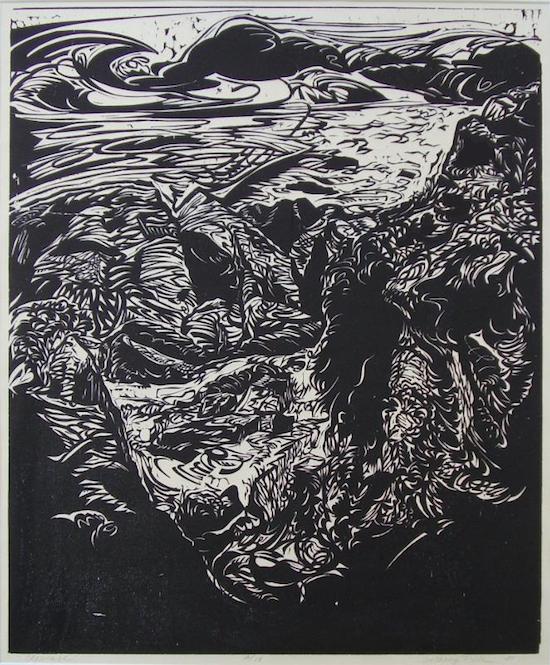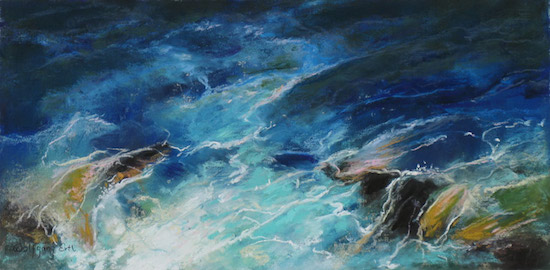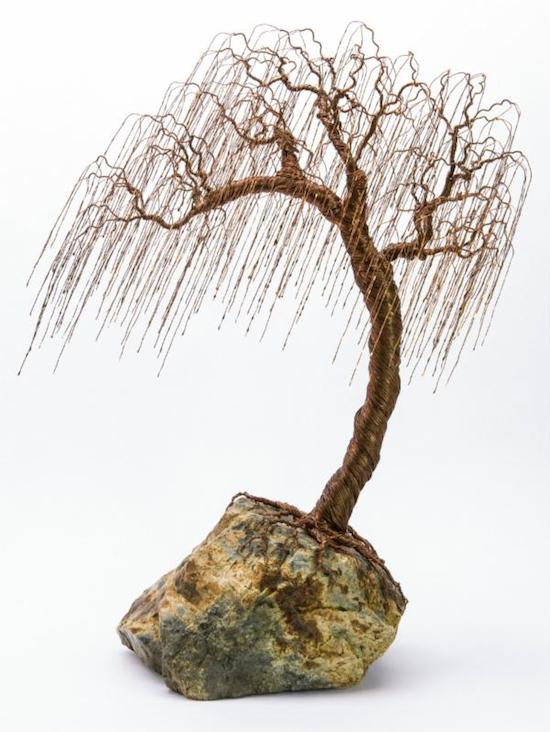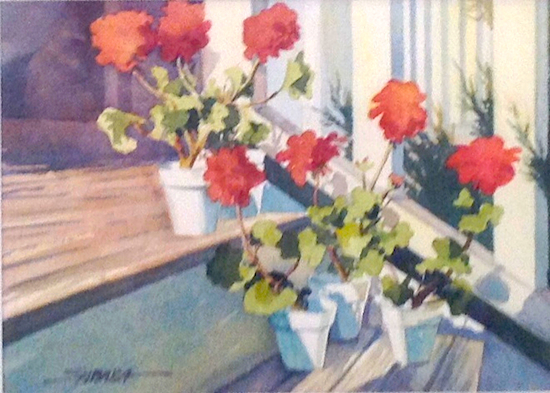
In an unresolved season
"Resolutions'' (oil on canvas), by Julia Purinton, at Alpers Fine Art, Andover, Mass.
Gotta go way up into the North Country to see this scene this year
"Iced'' (oil on aluminum panel), by Sue Charles, at Alpers Fine Art, Andover, Mass.
The big wind of the next two days
"Northeast Wind'' (acrylic and watercolor on raised panel), by Tamara Gonda, at Alpers Fine Art, Andover, Mass.
Moments of innocence
"Early Morning, Duck Creek, Wellfleet'' {on Cape Cod} (oil on recycled wood), by John Mulcahy, at Alpers Fine Art, Andover, Mass.
An open winter?
"Beaver Pond'' (oil on panel), by Sue Charles, at Alpers Fine Art, Andover, Mass.
That is, a beaver pond in an "open winter,'' with little snow. It has been open in most of southern New England so far this winter. Will we get clobbered soon? Or maybe we'll get most of our snow in March, as happened in 1956, after a very open winter until then? In any case, innumerable surprises lie ahead.
Meanwhile, "live every day as if it's your last, and someday you'll be right'' -- a line from the great movie Breaker Morant, set in the Second Boer War.
Rock is the Maine thing
"Toward Cranberry'' {Island, Maine} (oil on Lexan panel), by James Mullen, at Alpers Fine Art, Andover, Mass. The Maine Coast must be among the most beautiful coasts in the world. If only the water were a little warmer.
Beware the giant carp
"From the Canoe'' (oil on canvas), by Anne Ireland, at Alpers Fine Art, Andover, Mass.
Lovely but rather unwelcoming
"Rocky Shore'', by Philip Koch, at Alpers Fine Art, Andover, Mass.
Robert Burns: 'Winter: A Dirge'
''Winter Light'' (oil on canvas), by Susan Charles, at Alpers Fine Art, Andover, Mass.
The wintry west extends his blast,
And hail and rain does blaw;
Or the stormy north sends driving forth
The blinding sleet and snaw:
While, tumbling brown, the burn comes down,
And roars frae bank to brae;
And bird and beast in covert rest,
And pass the heartless day.
“The sweeping blast, the sky o’ercast,”
The joyless winter day
Let others fear, to me more dear
Than all the pride of May:
The tempest’s howl, it soothes my soul,
My griefs it seems to join;
The leafless trees my fancy please,
Their fate resembles mine!
Thou Power Supreme, whose mighty scheme
These woes of mine fulfil,
Here firm I rest; they must be best,
Because they are Thy will!
Then all I want—O do Thou grant
This one request of mine!—
Since to enjoy Thou dost deny,
Assist me to resign.
Soon enough
"Sunny Path'' (oil on panel), by PAUL GEORGE, at Alpers Fine Art, Andover, Mass.
New England's chilly mountains
"You Don't Say'' (oil on panel), by JULIA PURINTON, at Alpers Fine Art, Andover, Mass.
Gets even more violent after dark
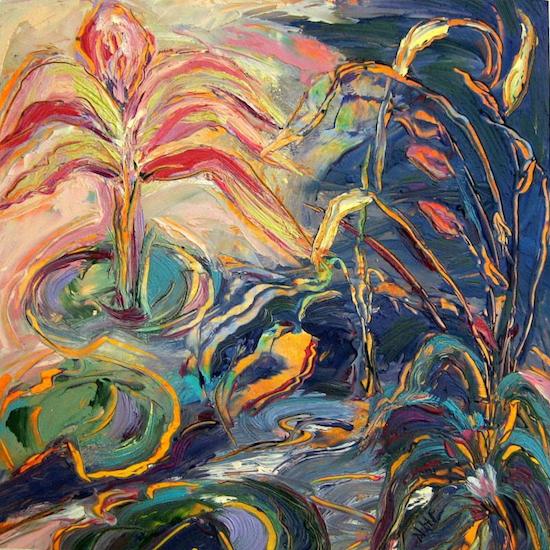 "Sunset on the Pond'' (oil stick on braced panel), by NAN HESS FELDMAN, in the "Hydration'' show at Alpers Fine Art, Andover, Mass.
"Sunset on the Pond'' (oil stick on braced panel), by NAN HESS FELDMAN, in the "Hydration'' show at Alpers Fine Art, Andover, Mass.
My parents for a few years lived on a pond they shared with a neighbor that was kept at slightly under 10 acres. More than 10 acres meant that they would have to give the public access to it under the colonial era "Great Pond'' rule.
They controlled the size of the pond via a little dam, which created a cute little waterfall. If they had chosen, they could have flooded a road downstream by pulling up a wooden slat. They did think that would be fun to try but never got around to it.
While my parents seemed to like the pond, with its canoe, little swimming raft and large population of bass, I always found it smelled too much of decaying organic material and iron (they used to mine a little nearby in colonial days) and hosted far too many mosquitoes that in an earlier time might have given you malaria.
I missed the usually antiseptic smell of the ocean at their previous place on a hill above the shore, where, unlike on the pond, hemmed in by tall trees and thick brush, there was almost always a breeze -- indeed, often a gale.
Some of the water in the pond flowed in a little stream from a cranberry bog. God knows what sort of pesticides were used there in pre-EPA days. But whatever they used wasn't enough to cut into the bass or snapping-turtle population as the brook flowed into the pond via a swamp that recalled the movie The African Queen, from which came one of the famous lines assigned to Humphrey Bogart: "One thing in the world I hate: leeches. Filthy little devils.''
Everything seemed so much cleaner in the winter, though the remoteness of the house and pond led one roofer to ask my mother if they had bought the land from Lewis and Clark.
Fairly soon after my father died suddenly we sold the place, unfortunately during a real-estate slump.
--- Robert Whitcomb
Pretty, but no smoking please
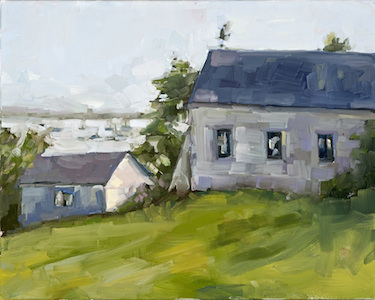 "Boathouse'' (oil on canvas), by LISA NOONIS, in the "Hydration'' show at Alpers Fine Art, Andover, Mass., through July.
"Boathouse'' (oil on canvas), by LISA NOONIS, in the "Hydration'' show at Alpers Fine Art, Andover, Mass., through July.
These old boathouses are moldy and firetraps and yet so soothing to look at.
I like best the ones that are extended over the water from the shore, as my Minnesota relatives had at their lake places, with the pines so thick around the building that you could barely see some of the boathouses from a couple of hundred yards offshore.
-- Robert Whitcomb















